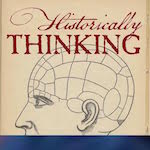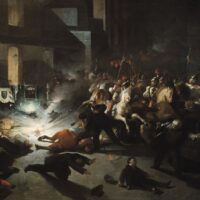

We believe that when people think historically, they are engaging in a disciplined way of thinking about the world and its past. We believe it gives thinkers a knack for recognizing nonsense; and that it cultivates not only intellectual curiosity and rigor, but also intellectual humility. Join Al Zambone, author of Daniel Morgan: A Revolutionary Life, as he talks with historians and other professionals who cultivate the craft of historical thinking.

Episode 356: First Dark Ages?
| Classical History, Collapse, Economic History, Social History
In 1177 BC a series of very unfortunate events culminated in the collapse of numerous kingdoms centered upon the western Mediterranean. The nature of those events, and how one played upon the other, was the topic of our conversation with Eric Cline way back in Episode 62, when we talked about his book 1177 BC: The Year Civilization Collapsed. Now ...
Episode 355: Steam Powered
| Antebellum United States, Cultural History, History of Technology, Social History
At a pivotal moment in Chapter 17 of Nathanael Hawthorne’s House of the Seven Gables, two of his protagonists escape from haunted Salem, Massachusetts, and are whirled away from its power by the even greater power of steam: “…Looking from the window, they could see the world racing past them. At one moment, they were rattling through a solitude; the ...
Intellectual Humility and Historical Thinking: William Caferro
| Intellectual Humility, Medieval History, Medieval Italy
This is another of our conversations on Intellectual humility and historical thinking. Today’s guest is William Caferro. He is the Gertrude Conaway Vanderbilt Professor of History at Vanderbilt University. He studies medieval European history, specializing in Italy. His research focuses on economic, military, social, literary and historiographical trends. Caferro is the author of Mercenary Companies and the Decline of Siena ...
Episode 354: Collisions
| Cold War, Diplomatic History, History of Russia, History of United States, Ukraine
In late July 2013, Vladimir Putin visited Kiev. There he celebrated the 1,025th anniversary of Christianity coming to the Kievan Rus. There he and Ukrainian President Victor Yanukovych stood shoulder to shoulder and celebrated the unity of Russia and Ukraine. At that moment–my guest Michael Kimmage writes– Putin and Yanukovych, Russia and Ukraine, seemed to be “twin protagonists of the ...
Intellectual Humility and Historical Thinking: Lorri Glover
| Intellectual Humility, Southern History, vocation
This is another of our conversations on intellectual humility and historical thinking. Today my conversation partner is Lorri Glover. She is Bannon Endowed Chair and Professor of History at St. Louis University. She has authored, co-authored or edited eleven books. Her interests are focused on the social history of the English colonies and the creation of the American Republic, and ...
Episode 353: Devils’ Rise
| Anarchism, History of the Modern World, Modernity, Socialism, Terrorism
On June 24, 1894, President of France Sadi Carnot was stabbed by an anarchist; on September 10, 1898, Empress Elisabeth of Austria was stabbed by an anarchist; on July 29, 1900, King Umberto I of Italy was shot by an anarchist; on September 6, 1901, President of the United States William McKinley was shot by an anarchist. If you have ...
Episode 352: Tecumseh, American Strategist
| Diplomatic History, History of the United States, Military History, Native American History, Strategy, Tecumseh
Where today is the Pequod? Where the Narragansetts, the Mohawks, Pocanokets, and many other once powerful tribes of our race? They have vanished before the avarice and oppression of the white men . . . The white usurpation in our common country must be stopped, or we, its rightful owners, will be forever destroyed and wiped out as a race ...
Intellectual Humility and Historical Thinking: Mark Carnes
Today’s guest is Mark Carnes, Professor of History at Barnard College. His academic speciality is modern American history and pedagogy. Among his many books are an edited volume, Meanings for Manhood: Constructions of Masculinity in Victorian America (University of Chicago Press, 1992), and Secret Ritual and Manhood in Victorian America (Yale University Press, 1989). An interest in how history appears ...
351: Pox Romana
| Disaster, Disorder, Epidemics, pandemic, Roman Empire
By the reign of Marcus Arelius, Rome seems to be unquestioned in its reach of its power, its wealth, and its cultural and intellectual sophistication. The Pax Romana stretched from Britain and Portugal to Syria and Egypt. Yet at the moment of its seemingly greatest achievements, Rome was struck by a disease that annihilated its legions and ravaged its cities. ...
Episode 350: Revolutionary Age
| Age of Revolutions, American Revolution, Haitian Revolution, Latin American History
From the 1760s into the 1830s, waves of revolutions rolled up upon the shores of the Atlantic World, confusing or destroying entrenched political and social hierarchies, and ushering in a new era of democratic rule. These of course were headlined by the American and French Revolutions, but there were no less important ones that quickly followed: not only the Haitian ...










